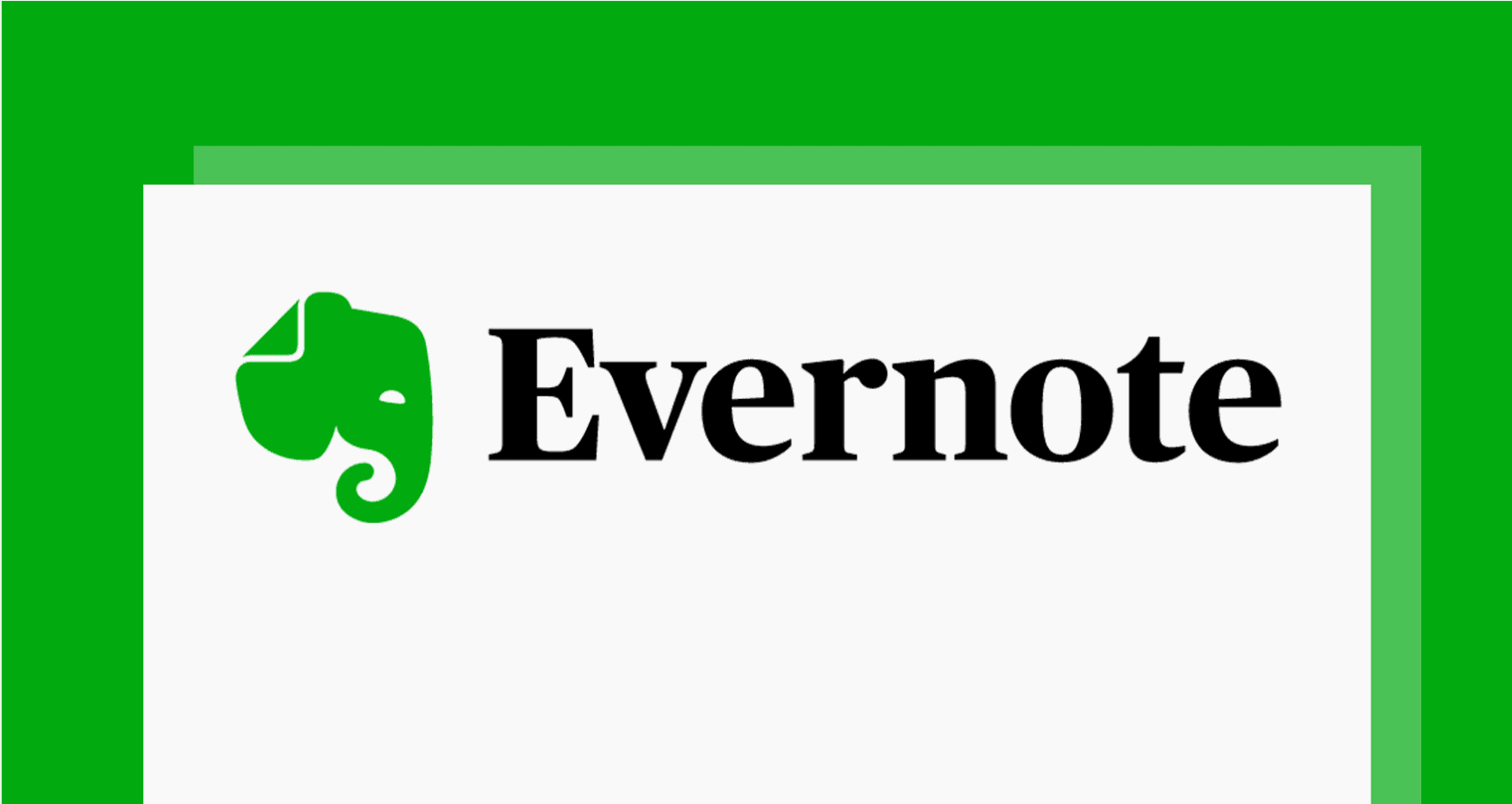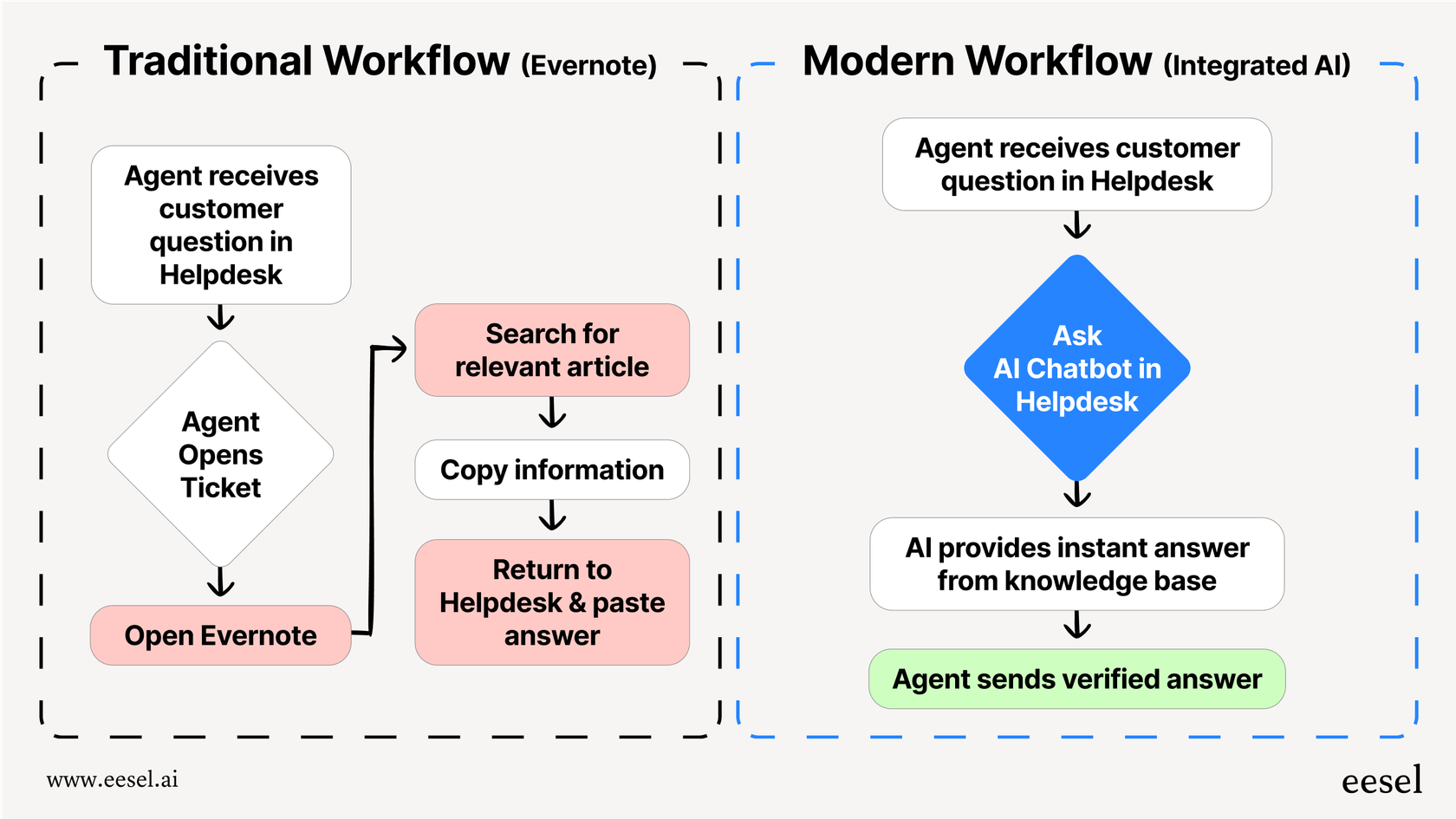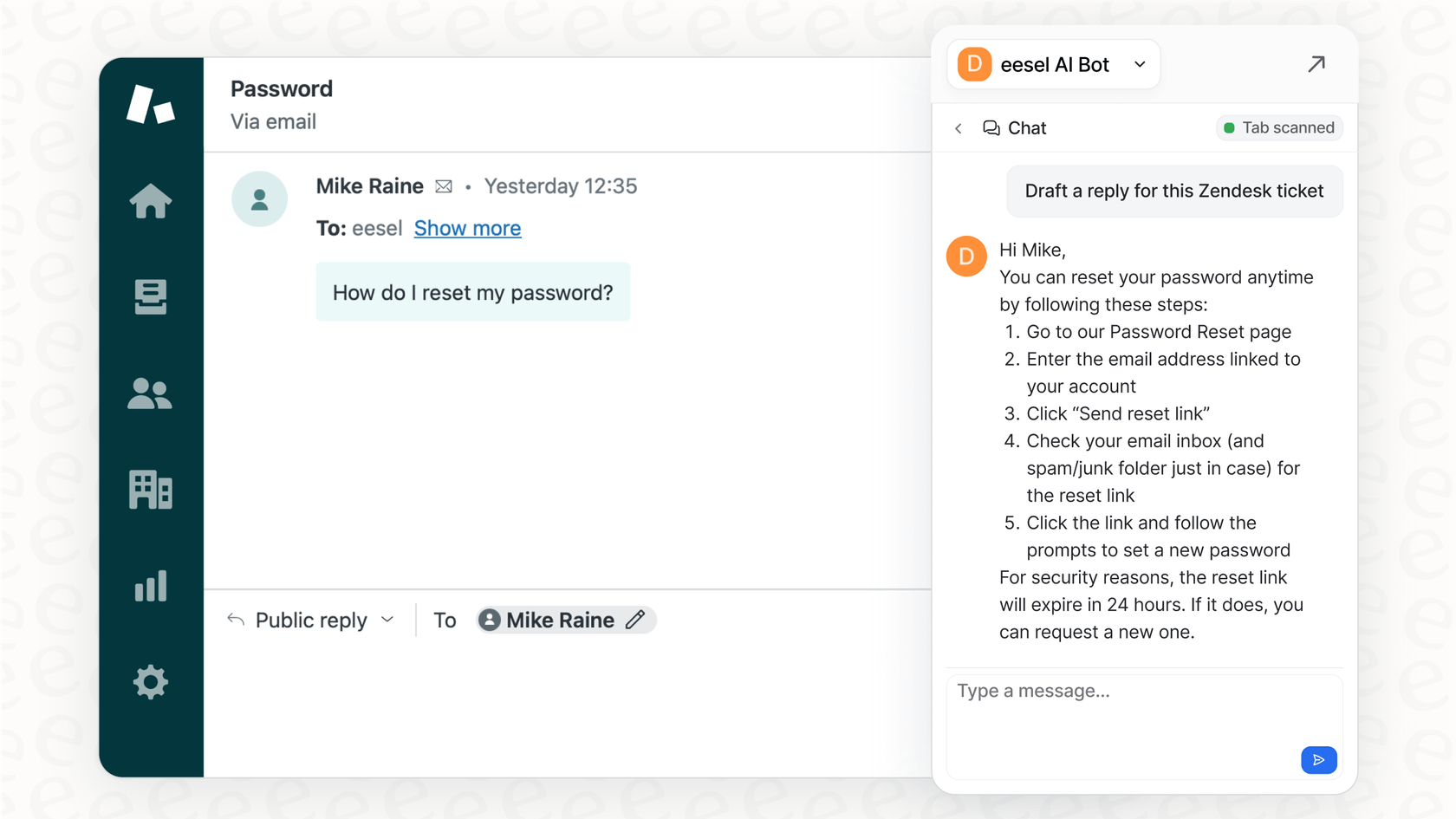An Evernote overview for modern teams: Is it enough in 2025?

Kenneth Pangan
Last edited October 2, 2025

Let’s be honest, many of us have a history with Evernote. It was probably one of the first apps that made us feel truly organized, like we had a digital "second brain." It was brilliant for capturing everything from scribbled ideas and meeting notes to scanned receipts and interesting articles we swore we'd read later. For getting your personal life in order, it was a revelation.
But the way we work has changed. A lot. Teams are moving at lightning speed, and everyone needs answers now. That pressure to resolve issues and get work done efficiently puts old tools under a new light. So, the big question is: does a tool originally built for personal organization still cut it as a knowledge hub for a modern team? This Evernote overview will dig into its features, pricing, and how teams use it to see if it still holds up.
What exactly is Evernote?
At its heart, Evernote is a do-it-all app for capturing, organizing, and finding your stuff. It doesn’t really care what format your information is in, you can throw text, images, PDFs, and even audio clips at it. The organizational system is pretty intuitive, especially if you’ve ever used a physical filing cabinet.
-
Notes: This is your basic document, the digital piece of paper where all your content lives.
-
Notebooks: Pretty straightforward, these are like folders for keeping related notes together.
-
Stacks: If you’re an organization fiend, you can group your notebooks into stacks for one more level of order.

Over the years, Evernote has added more features to its toolkit, like task management and calendar integrations, turning it into a more rounded platform. It’s a solid choice for anyone trying to go paperless and keep their important info in one spot.
A closer look at Evernote's features
To figure out if Evernote is a good fit for your team, it helps to know what it can actually do.
Great for capturing content
Evernote’s real talent has always been getting information into your account, no matter where it’s coming from. You can type notes the old-fashioned way, scan documents with your phone, or use the slick Web Clipper extension to save articles without all the distracting ads.
The magic, though, is in its search. Evernote uses something called Optical Character Recognition (OCR), which means it can actually read the text inside images and scanned PDFs. On the paid plans, its AI-Powered Search even lets you ask normal questions to find what you're looking for. It’s perfect for finding that one tiny detail from a meeting you had six months ago.

Connecting notes to your tasks and calendar
To help you turn information into action, Evernote lets you create tasks right inside your notes. You can add due dates, set reminders, and check them off as you go, which is nice for keeping your to-do list alongside the documents that sparked it.
The Google Calendar integration takes it a step further by letting you link notes directly to your meetings. It’s a handy way to keep your agenda, notes, and follow-up tasks all tied to the original calendar event.

Sharing and collaboration
You can share single notes or whole notebooks with teammates, which makes it easy to pass information around. You can also control whether they can just view the content, make edits, or invite other people.

This is helpful, for sure, but it also reveals something fundamental about how Evernote is designed. It's a passive way to collaborate. The information is all there, but your team members have to stop what they're doing, open Evernote, and hunt for the right note. For busy teams, that little bit of friction adds up and can really slow things down.
Where teams use Evernote (and where it starts to creak)
Lots of teams start out using Evernote for good reasons, but as they grow, they often hit the same walls. Let's walk through a couple of common situations.
The "let's just put it in Evernote" knowledge base
It’s a classic move: using Evernote as a starter internal wiki. It’s a simple spot to store company policies, how-to guides, and important documents. And hey, it’s way better than having that stuff scattered across a dozen different folders.
The problem: The knowledge is stuck. When a support agent gets a question from a customer, they have to leave their helpdesk, jump over to Evernote, search for the right article, and cross their fingers that it’s the latest version. This constant app-switching is a huge time-waster.

A different approach: Instead of making your team hunt for knowledge, modern tools bring the knowledge to them. A platform like eesel AI connects to all the places your company knowledge lives, whether that's Confluence, Google Docs, or Notion, and delivers answers automatically. For instance, eesel AI's AI Internal Chat lets employees ask questions right in Slack and get instant answers pulled from the entire company knowledge base. No more hunting.

Managing projects and meeting notes
Evernote is a fantastic place to capture meeting minutes, brainstorm, and track action items with its task feature. It gives you a clear record of what was discussed and what needs to happen.
The problem: Writing down a task isn’t the same as getting it done. Evernote can note that a new IT support ticket needs to be created, but it can’t actually create that ticket in your helpdesk and assign it. It's a system of record, not a system of action. This means someone still has to manually copy that information from Evernote into another tool like Zendesk or Jira.
A different approach: For support and IT teams, the real goal is to resolve issues, not just document them. Tools like eesel AI’s AI Agent plug into helpdesks like Zendesk or Jira Service Management and can handle common tickets all on their own. For trickier problems, the AI Copilot suggests high-quality replies for human agents to review and send in seconds. This turns your static knowledge base into an active part of your team that actually gets work done.

Evernote pricing and security
If you’re thinking about Evernote for your team, you’ll want to know what it costs and how it handles your data.
Pricing plans
Evernote has a few different subscription plans, from a pretty limited free version to a full-blown enterprise option.
| Plan | Price (Billed Annually) | Key Features |
|---|---|---|
| Free | $0 | Up to 50 notes, 1 notebook, 250 MB monthly uploads, sync on 1 device. |
| Personal | $10.83/month | Up to 150,000 notes, 2,000 notebooks, 10 GB monthly uploads, sync on unlimited devices. |
| Professional | $14.16/month | Everything in Personal, plus 20 GB monthly uploads, AI Edit & AI-Powered Search, PDF annotations. |
| Enterprise | Custom | Everything in Professional, plus SSO, dedicated success manager, and advanced admin controls. |
Note: All pricing info is based on data from the Evernote website as of late 2024.
How it handles security
Evernote does a good job with security. They use data encryption, offer two-step verification, and host their service on the secure Google Cloud Platform.
The catch for businesses: While that's great for your personal notes, businesses handling sensitive customer data in their support and IT workflows have a higher bar to clear for compliance.
A more business-focused solution: A platform like eesel AI is built for this kind of environment. It guarantees your company's data is never used to train general AI models, offers EU data residency to meet regional compliance rules, and is built on SOC 2 Type II-certified infrastructure. That gives you the confidence to automate parts of your customer-facing operations without worry.
The verdict: Is Evernote the right knowledge hub for your team?
Evernote is still a top-notch tool for personal productivity. It’s hard to beat for capturing ideas and organizing notes for small, collaborative projects. Its search is great, and its capture tools are some of the best out there.
This video provides a helpful visual guide for beginners looking for a general Evernote overview in 2024.
But for a growing business, its biggest weakness is that it creates a passive library of information. It makes your team do the work to find and use knowledge, which just doesn't work when things are moving fast. For modern support, IT, and ops teams, the goal isn't just to store knowledge, it's to activate it with AI and automation.
Turn your knowledge into action with eesel AI
If the "passive knowledge library" problem sounds painfully familiar, it might be time for a different approach. eesel AI is designed to solve that exact issue. Instead of creating another place to store information, eesel AI connects all your scattered company knowledge and uses it to power AI agents, copilots, and chatbots right inside the tools your team already uses.
You can get started in minutes on a platform that’s built to be self-serve, test everything with simulations before it ever touches a customer ticket, and automate workflows with complete control.
Ready to see what your company's knowledge can really do? Try eesel AI for free and put your knowledge to work.
Frequently asked questions
An Evernote overview primarily serves to introduce the app as a versatile tool for capturing, organizing, and finding various types of information, from text to audio clips. It highlights its intuitive system of notes, notebooks, and stacks for personal organization.
While this Evernote overview acknowledges its ability to share notes and notebooks, it points out that Evernote is designed as a passive collaboration tool. It requires team members to actively search for information, which can slow down fast-paced modern teams.
This Evernote overview emphasizes its excellent content capture capabilities, including typing notes, document scanning, and the Web Clipper. Its standout feature is OCR for searching text within images and PDFs, and AI-Powered Search on paid plans.
This Evernote overview identifies the problem of "stuck" knowledge, where team members must constantly switch apps to find information. It's seen as a passive library that doesn't actively bring knowledge to the user, leading to time-wasting app-switching.
The Evernote overview details a Free plan with limited features, a Personal plan for individual users, and a Professional plan offering more storage and advanced AI search. There's also a custom Enterprise plan for larger organizations needing advanced controls.
Yes, this Evernote overview notes that Evernote uses data encryption and two-step verification on Google Cloud Platform. However, it also highlights that businesses with sensitive customer data often have higher compliance needs that a more business-focused solution might better address.
Share this post

Article by
Kenneth Pangan
Writer and marketer for over ten years, Kenneth Pangan splits his time between history, politics, and art with plenty of interruptions from his dogs demanding attention.




